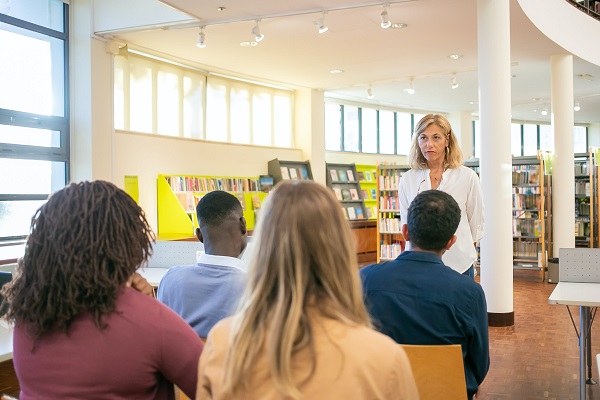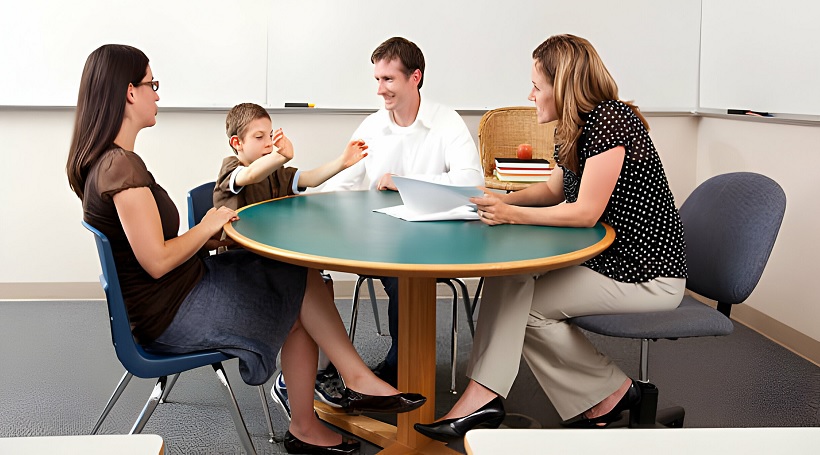Last Updated on January 1, 2025
Parent-teacher conferences allow direct communication but may be time-consuming. These conferences provide a valuable opportunity for parents and teachers to discuss a student’s progress and address any concerns.
They can improve communication, build rapport, and create a collaborative approach to supporting the student’s academic and personal development. However, they may require a significant time commitment from both parents and teachers and may not always result in tangible solutions or outcomes.
Understanding the pros and cons of parent-teacher conferences can help both parties make the most of these valuable interactions.
Benefits Of Parent Teacher Conferences

Parent-teacher conferences are an important aspect of a child’s education. These meetings provide a platform for parents and teachers to come together and discuss the progress and development of the student. They are an invaluable opportunity for both parties to share information and collaborate on strategies to support the child’s academic journey. Here are some distinct benefits of parent-teacher conferences:
Read More – How To Stop Breastfeeding?
Improved Parent-teacher Communication
Parent-teacher conferences act as a bridge between parents and educators, facilitating effective communication. These meetings enhance the relationship between both parties, ensuring that essential information is shared in a timely and transparent manner. Through face-to-face interaction, parents gain a deeper understanding of the classroom environment, teaching methods, and curriculum, enabling them to actively participate in their child’s education.
Better Understanding Of Student Progress
Another advantage of parent-teacher conferences is that they provide parents with insights into their child’s academic performance and behavior in the classroom. Teachers share comprehensive progress reports that outline the strengths and weaknesses of the student. This detailed feedback allows parents to have a clear understanding of their child’s overall development, enabling them to identify areas that need improvement and celebrate their achievements. It empowers parents to actively contribute to their child’s educational journey by providing targeted support at home.
Opportunities For Goal Setting And Improvement
Parent-teacher conferences also offer a valuable opportunity for parents, teachers, and students to collaboratively set goals and devise strategies for improvement. By discussing academic and behavioral challenges, parents gain valuable insights into their child’s specific needs and can work with the teacher to establish personalized goals. This collaborative approach ensures that everyone involved is on the same page, fostering a supportive environment for the student’s growth. Parent-teacher conferences act as a catalyst for ongoing communication and collaboration, with teachers and parents joining forces to help the student reach their full potential.
Read More – How To Improve Mother Milk Naturally?
Limitations Of Parent-Teacher Conferences
Time Constraints
Parent-teacher conferences are often limited to short time slots, typically lasting 10 to 15 minutes, making it challenging to address all concerns thoroughly.
Limited Opportunity To Discuss Individual Learning Styles
In such a brief window, there is often insufficient time to delve into individual student learning styles, which are crucial to tailoring educational strategies for each child’s unique needs.
Potential Discomfort Or Unequal Power Dynamics
It’s possible for parents to feel intimidated or uncomfortable in the formal environment of a parent-teacher conference, potentially leading to unequal power dynamics that hinder open communication.
Ways To Maximize The Effectiveness Of Parent-Teacher Conferences
Maximize the effectiveness of parent-teacher conferences by carefully assessing the pros and cons. By understanding the benefits and drawbacks, parents and teachers can optimize these meetings to foster a more productive and collaborative environment for the benefit of the student.
Parent-teacher conferences are crucial opportunities for parents and teachers to communicate about a child’s progress. By maximizing the effectiveness of these meetings, both parties can gain valuable insights and work together to support the child’s development. Several key strategies can be employed to ensure that parent-teacher conferences are as productive as possible.
Preparing Ahead of Time
Before the conference, parents should take the time to gather information about their child’s academic performance, behavior, and any concerns they may have. Reviewing previous assignments, test scores, and teacher feedback can provide valuable context for the discussion. Teachers can also benefit from reviewing the student’s progress and preparing specific examples of their work to share with parents.
Asking Specific Questions
During the conference, both parents and teachers should ask specific, targeted questions to address any areas of concern or interest. This could include understanding the child’s strengths, weaknesses, and areas for growth, as well as discussing specific incidents or behaviors that may need attention. By asking focused questions, both parties can ensure that the conversation remains productive and solution-focused.
Active Listening And Open Communication
Effective communication Is A Two-way Street. Both Parents And Teachers Should Prioritize Active Listening And Open Dialogue During The Conference. This Means Truly Hearing And Considering Each Other’s Perspectives, Experiences, And Concerns. By Actively Listening And Maintaining Open Communication, Parents And Teachers Can Work Together To Determine The Best Ways To Support The Child’s Academic And Personal Growth.
Read More – What Are The Benefits Of Mother Milk?
Alternatives To Traditional Parent-Teacher Conferences
Discovering alternatives to traditional parent-teacher conferences can be beneficial. While it allows for direct communication between parents and educators, it also requires commitment from all parties involved to ensure effective communication.
Parent teacher conferences have long been a staple in the education system, but they may not be the most effective way to foster productive communication between parents and teachers. Thankfully, there are several alternatives available that can enhance engagement, provide continuous updates, and ensure a more holistic understanding of a student’s progress and needs. In this section, we will explore three alternatives to traditional parent teacher conferences: Digital Platforms for Continuous Communication, Student-Led Conferences, and Parent Education Workshops.
Digital Platforms For Continuous Communication
Digital platforms offer a convenient and effective way for parents and teachers to maintain ongoing communication. With the help of these platforms, updates regarding a student’s academic performance, behavior, and overall well-being can be shared in real-time. This continuous flow of information eliminates the need to wait for parent teacher conferences, ensuring that any concerns or areas of improvement can be addressed promptly. Through online communication tools, parents can also ask questions or share their observations easily, fostering a collaborative approach in supporting their child’s educational journey.
Student-led Conferences
Student-led conferences empower students to take ownership of their learning journey and share their progress directly with their parents. Instead of the traditional format where teachers solely provide updates, these conferences put the students at the center stage, allowing them to showcase their projects, portfolios, and achievements. By actively participating in these conferences, students gain confidence, improve their communication skills, and develop a deeper understanding of their own strengths and areas for growth. As parents witness their child’s growth firsthand, they become more engaged in supporting their child’s academic and personal development.
Parent Education Workshops
Parent education workshops provide an opportunity for parents to learn more about various aspects of their child’s education. These workshops can cover a range of topics such as understanding curriculum standards, effective study techniques, ways to support social-emotional development, and strategies for fostering a positive learning environment at home. By attending these workshops, parents gain insights and practical knowledge that can enhance their ability to support their child’s learning. Moreover, these workshops create a space for parents to connect with one another, fostering a sense of community and collaboration in the pursuit of their children’s educational success.
The alternatives to traditional parent teacher conferences offer innovative ways to improve parent-teacher communication, student engagement, and parental involvement in their child’s education. By utilizing digital platforms, implementing student-led conferences, and hosting parent education workshops, schools can create a more inclusive and effective educational environment that benefits everyone involved.

Frequently Asked Questions On Pros And Cons Of Parent Teacher Conferences
How Do Parent-teacher Conferences Benefit Students?
Parent-teacher conferences provide a platform to discuss academic progress, address concerns, and build a collaborative relationship.
What Topics Can Be Discussed During A Parent-teacher Conference?
During a parent-teacher conference, you can discuss your child’s academic performance, behavior, social interaction, and strategies to enhance learning.
How Can Parent-teacher Conferences Foster A Supportive Home-school Connection?
Parent-teacher conferences promote open communication, understanding, and cooperation between parents and teachers, leading to better support for the child’s educational journey.
Are Parent-teacher Conferences Only For Discussing Concerns?
Parent-teacher conferences are not solely for addressing concerns; they are also an opportunity to celebrate achievements, highlight strengths, and set goals for future growth.
What Should Parents Do To Prepare For A Parent-teacher Conference?
To make the most of a parent-teacher conference, parents can review their child’s progress, jot down questions or concerns, and be open to constructive feedback and suggestions from the teacher.
Conclusion
To sum up, parent-teacher conferences have their advantages and disadvantages. On the one hand, they provide an opportunity for open communication and collaboration between parents and teachers, fostering a supportive environment for the child’s education. On the other hand, they can sometimes be overwhelming and time-consuming for both parties involved.
Ultimately, the effectiveness of parent-teacher conferences depends on clear objectives, efficient scheduling, and a focus on the child’s needs.

